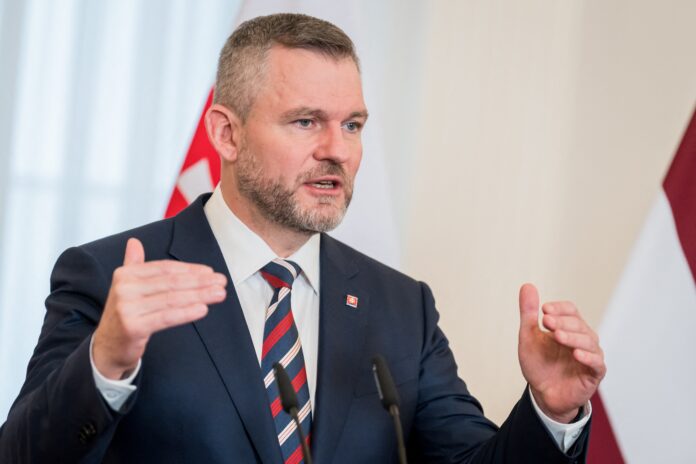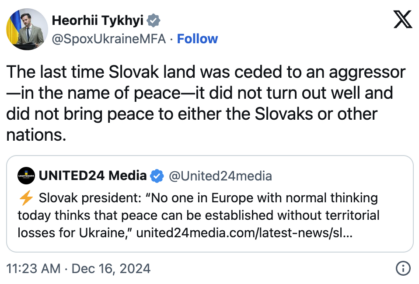
Slovak President Peter Pellegrini’s controversial remarks, suggesting Ukraine must accept territorial losses for peace, elicited a sharp rebuke from Ukrainian Foreign Ministry spokesperson Heorhii Tykhyi, who invoked Slovakia’s own history of appeasement in 1938 as a stark warning. Tykhyi’s response, delivered at the spokesperson level, signalled both firm disapproval and a deliberate dismissal of Pellegrini’s rhetoric as undeserving of higher-level diplomatic engagement. Pellegrini’s statements, however, are not isolated but reflect a broader shift under Slovakia’s current government, whose foreign policy has increasingly aligned with Russian interests. This trend is underscored by repeated, opaque engagements with Russian officials, the replacement of pro-Western diplomats with personnel educated in Russian institutions, the refusal to contribute €300 million to the EU fund for lethal aid to Ukraine, and the recent veto of EU sanctions against Georgian representatives following contested elections. These actions signal Slovakia’s growing divergence from NATO and EU priorities, deepening concerns about its susceptibility to Russian influence and raising alarms about the broader consequences for European security as Russia continues to test NATO’s resolve on its eastern flank.
Slovak President Peter Pellegrini’s recent statements regarding Ukraine’s territorial integrity have sparked controversy at home and abroad. Speaking during a Slovak political programme, Pellegrini argued that peace could not be achieved without territorial compromises from Ukraine. “No one in Europe with normal thinking today thinks that peace can be established without territorial losses for Ukraine,” Pellegrini stated, framing his remarks as a call for “realism” in negotiations between Kyiv and Moscow.
The Ukrainian outlet United24 Media immediately highlighted Pellegrini’s comments as a dangerous precedent, sharply opposing any suggestion that peace could come at the cost of Ukraine’s sovereignty. Ukrainian President Volodymyr Zelenskyy, in an August press conference, made Kyiv’s position clear: “The war can only end with the restoration of Ukraine’s territorial integrity and the prevention of further aggression from Putin and Russia.”
Zelenskyy’s stance remains consistent with NATO and EU principles: any negotiations must preserve Ukraine’s internationally recognised borders. In a December interview with CBN News, Zelenskyy further emphasised that Kyiv would only consider NATO membership offers aligned with these borders.
Reacting to Pellegrini’s remarks, Heorhii Tykhyi, spokesperson for Ukraine’s Ministry of Foreign Affairs, issued a strong historical reminder. “The last time Slovak land was ceded to an aggressor—in the name of peace—it did not turn out well and did not bring peace to either the Slovaks or other nations,” Tykhyi stated, directly referencing the 1938 Munich Agreement. That event, which led to the partitioning of Czechoslovakia, serves as a stark lesson about the consequences of appeasement.

The decision to respond at the spokesperson level reflects Ukraine’s measured but firm stance, underscoring that Pellegrini’s comments were unacceptable while avoiding unnecessary escalation by engaging at the presidential or ministerial level. This approach subtly diminishes the credibility of Pellegrini’s remarks, treating them as unworthy of high-level diplomatic engagement while delivering a clear message of disapproval.
Pellegrini’s Comments in Context: Slovakia’s Alignment with Russia
Pellegrini’s statements reflect Slovakia’s broader foreign policy shift under the Fico government, which has increasingly aligned itself with Russian interests. Foreign Minister Juraj Blanár’s repeated and opaque meetings with Sergey Lavrov, combined with the replacement of pro-Western diplomats with Russian-educated personnel, have raised concerns over Kremlin influence in Slovak policymaking. Meanwhile, the leader of the coalition’s pro-Kremlin Slovak National Party (SNS), Andrej Danko—a vocal advocate for closer ties with Moscow—has overt ties to Russian leadership, including past praise for Vladimir Putin and ongoing visits to Moscow. Danko has recently announced plans to visit Russia alongside Tibor Gašpar, the former police chief and father of Slovakia’s intelligence head, citing energy cooperation as justification. Additionally, the Slovak government’s refusal to contribute €300 million to the EU fund for lethal aid to Ukraine further signals its divergence from NATO and EU priorities and deepens concerns over its susceptibility to Russian influence, and the most recent instance of this trend came when Slovakia, alongside Hungary, vetoed EU sanctions against Georgian officials, with Blanár rejecting the European Parliament’s criticism of Georgia’s election results as “interference” while defending the legitimacy of the contested outcome.
Strategic Implications for NATO and Slovakia’s Security
While Pellegrini’s comments may appear pragmatic, they ignore the reality that Ukraine’s defence is directly tied to Slovakia’s security and NATO’s deterrence posture. If Russia is allowed to succeed in its territorial aggression, it would set a dangerous precedent, emboldening further advances against NATO’s eastern flank.
Slovakia’s ambiguous positioning risks undermining NATO’s unity and credibility at a time when cohesion is critical. The Fico government’s closer ties to Moscow and refusal to support Ukraine militarily directly contradict the Alliance’s collective approach to deterring Russian aggression.
Furthermore, the replacement of Slovakia’s pro-Western diplomatic corps with Russian-aligned personnel represents a structural vulnerability that could compromise national security. This ideological shift within Slovak institutions makes it increasingly difficult to realign the country’s foreign policy with NATO and EU principles.
Pellegrini’s Remarks Reflect a Larger Pro-Kremlin Trend
President Pellegrini’s remarks suggesting Ukraine may need to accept territorial losses for peace have provoked justified criticism from Ukrainian officials and media. United24 Media and the Ukrainian MFA have rightly pointed out that such rhetoric risks legitimising Russian aggression, drawing parallels to Slovakia’s own history of territorial concessions in 1938.
However, these remarks are not isolated; they align with a broader pattern of Slovakia’s Fico government fostering closer ties with Russia. The repeated engagements between Foreign Minister Juraj Blanár and Sergey Lavrov, the restructuring of Slovakia’s diplomatic corps, and Andrej Danko’s sustained loyalty to the Kremlin all point to a systemic realignment. In this context, Pellegrini’s comments are less an isolated misstep and more a symptom of Slovakia’s increasingly ambivalent position within NATO and the EU.
For Slovakia, this trajectory carries severe consequences. Supporting Ukraine’s sovereignty is not merely about principle but about securing NATO’s eastern flank and protecting Slovakia’s own borders from Russian aggression. Any rhetoric or policy that undermines Ukraine’s resistance weakens Europe’s collective security and emboldens an aggressor whose ambitions clearly extend far beyond.







